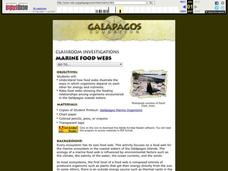Curated OER
Understanding Interactions Among Local Species and the Local Environment
Students examine the differences between biotic and abiotic factors, explain the difference between habitat and niche and compare how organisms get their nutritional needs. In this local environment activity students trace the path of...
Curated OER
Biology Vocabulary
In this biology activity, students identify and locate various vocabulary terms pertaining to food webs and animal species. There are 52 biology terms located in the word search.
Curated OER
Principles of Ecology
For this ecology worksheet, students will review 10 vocabulary words associated with the basic principles of ecology. This worksheet has 10 fill in the blank questions.
Curated OER
Bering Sea Buffet - A Foodweb Activity
Life in the Bering Sea, food webs, and the ocean ecosystem are introduced with a map activity. The lesson starts as kids explore maps and images of the Bering Sea, then it kicks into high gear as they start to discuss the types of...
Curated OER
2005 Hidden Ocean Expedition What's Eating You?
Analyze data and make inferences about the trophic position of organisms in the Canada marine food web. After a review of the geography and formula, discuss results and write an essay to improve the understanding of Artic food webs.
Curated OER
Six Levels of Ecological Organization
Ninth graders describe the six levels of ecological organizations and give examples of each. They also differentiate between food chains and webs and identify trophic and consumer levels in food chain and food webs.
Curated OER
Food Web Mobile
Students explain the main concepts of food webs and food chains. They
describe the role of animals, plants, and other organisms in cycling energy and matter through a food web by creating mobiles. Lesson contains adaptations for all levels.
Curated OER
Cycling of Matter and Energy
These twenty various types of questions related to the cycling of matter and energy require students to match each definition in column 1 with the correct vocabulary term from column 2. Then, students explain what is being demonstrated...
Curated OER
What Should I Know about Biosphere?
If your class is learning about the biosphere, you may find a study guide or reading guide helpful. Focusing on vocabulary, processes, and interactions, the Word document is easy to edit as needed to fit your needs. Another great option...
Curated OER
Human Impact Starts with?
What kind of effects do humans have on their environment? Review key anthropogenic vocabulary with a fill-in-the-blank handout. You may wish to use this as an ongoing glossary, review before a test, or even create a crossword puzzle or...
Curated OER
Constructing A Food Web
Students identify and explain the relationships within a food web. They use index cards to glue pictures of producers and consumers. On the back of the card, students name the organism, list the type of biome in which it is found.
Curated OER
Nutrition and Energy Flow
In this energy flow worksheet, students will complete 10 short answer questions based on a food web diagram. Then students will review different cycles in nature including the water cycle, carbon cycle, and energy cycle. This worksheet...
Curated OER
Marine Food Webs
Students examine how food webs illustrate the ways in which organisms depend on each other for energy and nutrients, and make food webs showing the feeding relationships among organisms encountered in the Gal??pagos coastal waters.
Curated OER
Ecology and The Endangered Species Act
Learners listen to a lecture about the basics of Ecology. They take a field trip in which they observe a specific organism and their characteristics.
Curated OER
Food Chains Are Not A Necklace!
Second graders examine how food chains interact with different plants and animals. They practice using new vocabulary. They also discover the role of pesticides in the environment.
Curated OER
Life In Extreme Environments
Students work together to design and participate in experiments to determine the rate rotifers eat. After completing their experiments, they record and analyze their data and identify any challenges faced during the procedure. They...

















